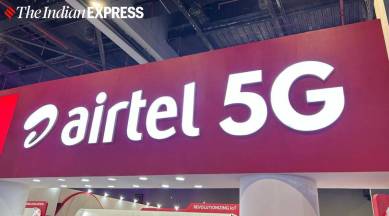Airtel 5G live in more cities in Delhi NCR: Here’s the complete list where Airtel 5G is available
Airtel recently rolled out 5G services in five cities in Delhi NCR and Agartala.

In October last year, Bharti Airtel announced that it would start rolling out 5G services in cities like Delhi, Mumbai, Varanasi, Bengaluru, Hyderabad, Chennai, Nagpur and Siliguri in a phased manner. Recently, Airtel announced that 5G is also available in Agartala, Noida, Ghaziabad, and Faridabad.
Airtel 5G: Full list of cities
The telecom network has expanded its 5G coverage in cities like Guwahati, Vizag, Patna, Muzaffarpur, Bodh Gaya, Bhagalpur, Ahmedabad, Gurugram, Panipat, Shimla, Jammu, Srinagar, Ranchi, Jamshedpur, Kochi, Pune, Indore, Imphal, Parayagraj, Kanpur, Gorakhpur, Meerut, Agra, Lucknow, Rourkela, Cuttack and Bhubaneshwar, Dehradun, Jaipur, Udaipur and Kota.
monthly limit of free stories.
with an Express account.
Airtel says it has plans to cover all major cities in India by the end of 2023. Just a month after Airtel rolled out 5G services in the country, it claimed that more than one million customers on the network had switched to 5G.
While Airtel 5G does not require users to upgrade their SIM or any invite from the telecom provider to use 5G on mobile devices, the company is offering the same amount of data as your existing 4G plan. Bharti Airtel bid for and acquired 19867.8 MHZ spectrum in 900 MHz, 1800 MHz, 2100 MHz, 3300 MHz, and 26 GHz frequency.
Unlike Reliance Jio’s standalone 5G architecture, Airtel 5G is based on non-standalone 5G architecture, which makes use of a 4G base station with 5G components on top. This is why Airtel 5G is a bit slower when compared to Reliance Jio 5G, which offers higher speeds and a lower latency.